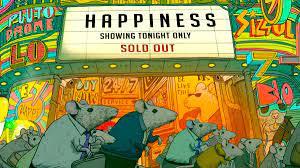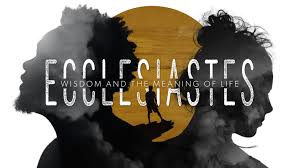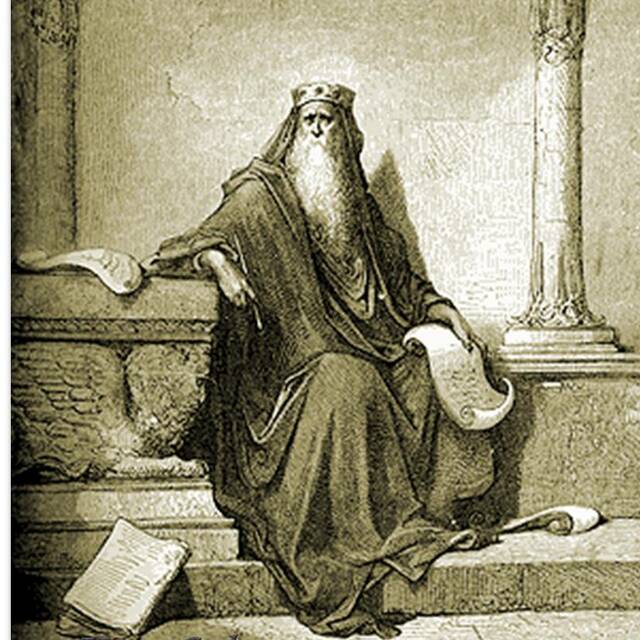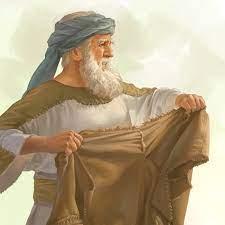Cr – The Crook in the Lot Ecclesiastes 7: 13-22
The Crook in the Lot
Ecclesiastes 7: 13-22
The crook in the lot DIG: What observations inspire the warnings in verses 15-18? What is meant by overly righteous or overly wicked? Would the Teacher say, “Nothing in excess, everything in moderation?” How does such a view square with genuine fear of the LORD? Is verse 20 a confession, an excuse, or an accusation? What light does it shed on verse 19? What is the danger of paying too much attention to gossip? What theme unites 7:19-22?
REFLECT: If God put a crook in your lot, would you try to make it straight? Would you get rid of your disability or disease? Would you change your job or your financial situation? Would you change your appearance, or your abilities, or your situation in life? Or would you trust God for all the crooked things in life and wait for Him to make them straight, even if you had to wait until the resurrection, just like Yeshua did when He died on the cross?
In His sovereignty over our suffering, God is at work to accomplish our spiritual good.
We are, therefore, called to trust Him, even when things seem to be crooked.
Maybe your life is so carefree that you have been untouched by human suffering. Then again, maybe not. Maybe you have had to deal with a lot of brokenness: chronic illness, depression, anxiety, personal betrayal, broken relationships, false allegations, destructive sins, bereavement and sorrow. When things like this happen to us or the ones we love, two things can happen. We can turn away from the Lord in pain and anger, or we can run to the Lord, believing in His sovereignty over our lives, seeking His help and comfort.
The sovereignty of God (7:13-14): Consider the work of God (7:13a). The command here is to consider – to make a careful observation of the way God works. Solomon noticed the world around him. He studied the seasons of life, learned when it was time for this and time for that. He watched the way people worked and played. He saw how they lived and how they died. Here, he invites us to join him by considering the work of ADONAI in the world. Then the Teacher asked a rhetorical question: Who can make straight what He has made crooked (7:13b)? The answer, of course, is no one. Things are the way God wants them to be; we do not have the ability to overrule the Almighty.
When the Teacher is talking about something crooked, he is talking about some trouble we have in life that we wish we could change, but cannot. It happens to all of us. We struggle with physical limitations. We suffer the breakdown of personal or family relationships. We have something that we wish we didn’t have, or don’t have something we wish we did. Sooner or later, there is something in life that we wish to God wasn’t there. According to Solomon, ADONAI has given each of us a different situation in life. This is what I have observed to be good: that it is appropriate for a person to eat, to drink and to find satisfaction in their toilsome labor under the sun during the few days of life God has given them – for this is their lot. Moreover, when God gives someone wealth, possessions and the ability to enjoy them, to accept their lot and be happy in their toil – this is a gift of God (5:18-19). When some people here Solomon talk along these lines they assume he is a fatalist. Some things in life are straight, other things are crooked. But whether things are crooked or straight, there is absolutely nothing we can do about it. It all comes down to fate, or predestination.
But there is another way to look at these verses. We need to see our situation in terms of the sovereign goodness of God. If there is a crook in our lot, it is the work of God, which it would be futile for us to try and change. One way to see the difference between despairing of our lot and hoping in YHVH is to compare Ecclesiastes 7:13 to what Solomon said back in Ecclesiastes 1:15. The wording in the earlier verse is almost identical: What is crooked can’t be straightened. Notice, however, that the first time the Teacher made this statement he left ADONAI out of the picture, giving us a clear, old picture of man’s life without God. But here in Chapter 7, Solomon brings God back into the picture. He looks at the world according to the LORD, and puts both the straight things and the crooked things under His divine care.
It is still true that there is nothing we can do to straighten out what is crooked. We cannot change what God has done unless, and until, He wants to change it. We do not have the power to edit God’s agenda. But far from driving us to despair, the sovereignty of YHVH gives us hope through all the trials of life. We do suffer the frustration of life in a fallen world. But the Bible promises us that God has a plan to set us free from all this futility, and that as He carries out the plan He is working all things together for our good (Rom 8:20, 28).
Trusting in the sovereign goodness of God helps us know how to respond to both the joys and trials of life. Whether we are having a good day or a bad day, there is always some way for us to glorify God. So the Teacher says: When things are going well, enjoy yourself; but when things are going badly, consider that God made the one alongside the other, so that people would learn nothing of their futures 7:14). This perspective puts today and every day under the sovereignty of God. Some days are full of prosperity. The sun is shining, the birds are singing, and ll is right with the world. Every good day, every tasty meal, every financial windfall, every meaningful conversation, every single pleasure, every success in ministry – every blessing of any kind at all is a gift from God’s grace that calls us to joy.
Not all days are like that, of course. Some days are full of adversity rather than prosperity. The sun is not shining, the birds are not singing, and nothing seems right with the world. It looks like our trials will never end, and we wonder if we have even one friend in the world. Yet, this day also comes from the hand of Ha’Shem; it is under His sovereign care. The Teacher does not have the heart to be joyful on such a difficult day, but he does call us to consider the ways of YHVH. When adversity comes, we should recognize that this too is a day that the Lord has made.
We must entrust every day of our lives to the loving care of a sovereign God, then we will be ready for anything and everything that life throws at us. In his comments on this verse, Martin Luther advised, “Enjoy the things that are present in such a way that you do not base your confidence on them, as though they were going to last forever . . . but reserve part of your heart for God, so that with it, we can bear the day of adversity.” Whatever trials we have in this life, it helps to go through them with Yeshua at our side. If we are wise, we will offer whatever joys we experience back to God in thanksgiving. This is all part of what it means to consider the work of God (7:13a). Solomon is telling us to accept what ADONAI has done and surrender to His sovereign will, praising Him for all our prosperity and trusting in Him through every adversity.293
Two dangers that lead to destruction: If the Teacher’s perspective seems a little simplistic so far, a little too easy, then we can probably relate to what he says next. No sooner has he told us to consider the works of God than he struggles with God’s sovereignty. Remember, Solomon promised that he was totally committed to telling us the truth about life. What he tells us here is that sometimes life can be desperately unfair. In my pointless life, I’ve seen everything – from the righteous person perishing in spite of his uprightness to the wicked one who lives a long life in spite of continual wickedness (7:15). That is exactly the opposite of what most people expect. The righteous people ought to rejoice in their prosperity, while the wicked suffer adversity until they finally admit that God is in control. All too often, what we see instead is what Solomon saw: righteous people dying before their time while their enemies kept on living. Godly pastors are martyred for their faith, while their murderers live to terrorize the congregations of God another day. Innocent victims get cut down in the prime of their life, yet their attackers never get caught. It’s just not fair!
There are some crooked things in life that we wish we could straighten out. But since we can’t, the Teacher gives us some practical advice: So don’t be overly righteous or overly wise; why should you disappoint yourself? But don’t be overly wicked, and don’t be foolish; why should you die before your time (7:16-17)? Solomon is not being cynical here. If that was what he meant, then he would have had to be looking at life under the sun again, leaving God out of the picture, and thinking about good and evil the way that only an unbeliever can. No. When he tells us not to be overly righteous, he meant they should not depend on their own righteousness or wisdom to guarantee God’s blessing because they might be disappointed like ones whom Solomon had seen perishing in spite of their own supposed righteousness (7:15).
To help us avoid thinking of ourselves too highly, the Teacher warns us not to be – so to speak – too righteous. We should never think that we are too good to suffer, or that it would be unfair if someone likes us to have a crook in our lot. Yet, it is often tempting to say, “God, I don’t deserve this. Don’t you know who I am? And it’s only a short step from there to saying, “Who does God think He is anyway?”
That is not to say that we should be unrighteous, of course. Solomon warns against this mistake in verse 17, when he tells us not to be too wicked. His point here is not that it’s okay for us to be a-little-bit wicked, as if there could ever be such a thing. Rather, the Teacher’s point is that there is a danger in giving ourselves over to evil. It is one thing to sin from time to time, as everyone does. Solomon will say in verse 20, “For there isn’t a righteous person on earth who does only good and never sins.” Though he believed that complete righteousness is unattainable, and that some foolishness is unavoidable, he never advocated folly or wickedness. Instead, he advocated living life in light of God’s judgment (11:9 and 12:14). Though he had observed exceptions to the doctrine of retribution (7:15 and 8:10-11), he nevertheless believed that God would judge (3:11 and 17). Therefore, people should avoid foolishness and wickedness as much as possible and live wisely and as righteously as possible.
Thus, there are two dangers for us to avoid: self–righteousness and unrighteousness. Both errors will lead to destruction; they may even lead to an untimely death. But there is a way to avoid both dangers, and this is to live every day in the fear of God. Solomon says: Don’t grasp just one of these rules; take hold of the other as well; for he who is in fear of God will live by both of them (7:18). To fear God is to know that He is God and we are not. It is to hold Him in awe for His majestic beauty. It is to have respect for His mighty and awesome power. This helps us not to pretend to be something that we’re not. It also keeps us from living a wicked life, because when we understand God’s holiness, the last thing we will want to do is fall under Ha’Shem’s righteous judgment.294
Solomon gives wisdom high value. To a wise man wisdom is better protection than ten rulers in a city. Power from within is needed more than advice from without. Also, don’t take every word spoken seriously, such as when you hear your servant speaking badly of you; because often, as you yourself know, you have spoken badly of others (7:19 and 21-22). Our own experience is sufficient proof that vindictiveness arises from human sinfulness and is frequently inaccurate.295
Why God allows suffering: When we really fear Ha’Shem, it will help us to look beyond our present difficulties and see the work of God, accepting all the crooked things in our lives until He chooses to make them straight. But as with many who have suffered greatly, we ask why does God leave some things crooked, even when we pray for Him to make them straight? Let’s look at the four main reasons:
First, the cooked things in life are a test to help us determine whether we really are trusting in Messiah for our salvation. Think of Job, for example, who was afflicted with many painful trials in order to prove the genuineness of his faith. Our own sufferings may have the same purpose by the grace of God, they confirm that we are holding on to Messiah, and that He is still holding on to us (see the commentary on Jude, to see link click Bb – To Him Who is Able to Keep You from Stumbling).
Second, God carefully designs whatever crooks we have in our earthly lot to turn our hearts away from this pointless world and teach us to look for happiness in the world to come. Suffering is part of our preparation for eternity. Consider the Prodigal Son (see the commentary on The Life of Christ Hu – The Parable of the Lost Son and His Jealous Brother), who didn’t return to his father until he had lost everything he had. His sufferings were part of a pilgrimage that led him back home where he belonged. When something in life seems crooked, remember that a day is coming when God will make it straight.
Third, God uses the crooked things in life to convict us of our sins. The reason that anything is crooked at all is because there is sin in the world, including our own sin. The Spirit often takes the crooks in our lot and uses them to touch our conscience, reminding us of some particular sin that we need to confess. It would be a mistake to think, every time we suffer, that this must be because of our sins. But it would also be a mistake to miss the opportunity that every trial brings to repent for any unconfessed sin.
Fourth, God may use the crooked things in life to correct us for our sins. There are times when suffering serves as an instrument of God’s justice. So it was for David, after he had murdered Uriah. Ha’Shem justly decreed that the sword would never depart from his house (see the commentary on the Life of David Dd – Nathan Rebukes David). When we suffer it may be because, as a consequence for our sin, we are under discipline of God (see the commentary on Hebrews Cz – God Disciplines His Children).
These are not the only reasons why ADONAI makes some things crooked. Sometimes God allows us to suffer in order to keep us from committing sin, or else to uncover a sinful attitude of the heart so deep that it could only be revealed by suffering a painful trial. Or maybe – and this is the happiest reason of all – God puts a crook into our lot in order to display His grace through our godliness under trial. We are prone to “fits of spiritual laziness.” But when we have a crook in our lot, it rouses us from our spiritual slumber and produces many acts of faith, hope, love, self-denial, and other graces.
The Shepherd’s crook: The point in listing these possible reasons for our suffering is not to suggest that we can always figure out why ADONAI has put some particular crook in our lot. Rather, the point is that God knows why He has put it there. When something in life seems crooked, we are usually quick to tell YHVH how He should straighten it out. Instead, we should let the Lord straighten us out! In His sovereignty over our suffering, God is at work to accomplish our spiritual good. We are, therefore, called to trust Him, even when things seem to be crooked.
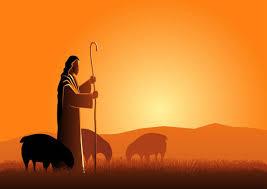
Whenever we have trouble believing that God knows what He is doing, we should consider the work of our Savior. Remember that our Good Shepherd once had a crook in His lot – a crook that came in the shape of a cross. In His prayer at the Garden of Gethsemane, Yeshua asked His Father if there were any way to make the cross straight instead of crooked. But there was no other way. As Yeshua considered the work of ADONAI, He could see that the only way to make atonement for our sin was to die in our place. So, Messiah suffered on the crooked cross that it was His God-given lot to bear. And He trusted His Father through His sufferings, waiting for Him to straighten things out when the time was right by raising Him up from the tomb on the third day.
If God can straighten out something as crooked as the cross, then surely we can trust Him to do something with the crook in our lot. This was the testimony that James Montgomery Boice gave the last time he spoke to his congregation at Philadelphia’s Tenth Presbyterian Church. Dr. Boice had been diagnosed with a fatal and aggressive cancer; by the time he announced his illness, he had only weeks to live. This was the crook in his lot. So, in his farewell address Dr. Boice raised a serious question that was based on the sovereignty of God. “If God does something in your life,” he asked, “would you change it?” To say this in a way Solomon would have said, “If God put a crook in your lot, would you try to make it straight?”
Well, would you? Would you get rid of your disability or disease? Would you change your job or your financial situation? Would you change your appearance, or your abilities, or your situation in life? Or would you trust God for all the crooked things in life and wait for Him to make them straight, even if you had to wait until the resurrection, just like Yeshua did when He died for you on the cross?
Dr. Boise answered his rhetorical question by testifying to the goodness of God’s sovereign will. He said that if we tried to change what God has done, then it would not be as good; we would only make it worse. The Teacher who wrote Ecclesiastes said something similar. Consider the work of God, he said: Don’t try to straighten out what God has made crooked (7:13). Our Savior would say the same thing. “When you consider the work of God,” He would say, “remember most of all, My love for you through the crooked cross, and trust our Father to straighten everything out in His own good time.”296
Dear Heavenly Father, Praise You that Your love and presence is the most awesome reward that anyone could have. When we need someone to talk to for guidance or just for fellowship, people are often busy or gone, but You are always with those who love You. Yeshua answered and said to him: If anyone loves Me, he will keep My word. My Father will love him, and We will come to him and make Our dwelling with him (John 14:23). We can live with the comfort of knowing that You are always available to help us. For God Himself has said, “I will never leave you or forsake you,” so that with confidence we say, “The Lord is my helper; I will not fear” (Hebrews 13:5c-6). Thank You for being so wonderful. In Your holy Son’s name and power of His resurrection. Amen








